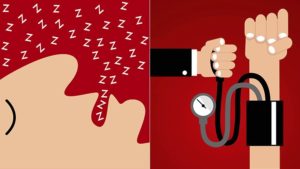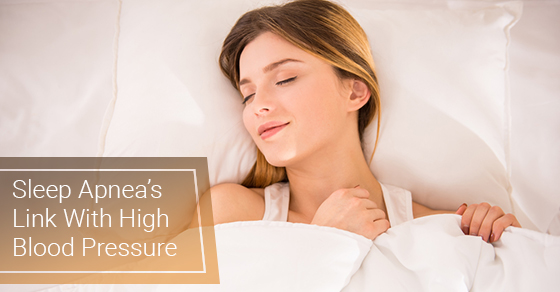How Sleep Apnea and High Blood Pressure Mix

Sleep Apnea and high blood pressure are wound together in most instances. As blood oxygen levels drop during sleep, it is a common instance for someone who has untreated Sleep Apnea. When blood oxygen content dips below normal levels, the brain sends multiple signals to peripheral and internal blood vessels to “squeeze” and “push” the flow of blood oxygen1.
Research has shown that treating Sleep Apnea, lowers Blood Pressure (a.k.a Hypertension). This is achieved with consistent adherence to CPAP therapy.
Today’s article discusses Sleep Apnea and associated cardiovascular conditions, including Sleep Apnea and hypertension. We’ll provide tips to you live with Sleep Apnea.
Sleep Apnea, the High Blood Pressure culprit?
Sleep Apnea plays a role in leading to high blood pressure.1. High blood pressure has been linked to many things, including:
- Diet
- Alcohol Consumption
- Caffeine Intake
- Sleep Conditions
Controlling or eliminating one of these risk factors can lead to a lower blood pressure. Studies also revealed when a person’s blood pressure is being treated but is not regulated, a more effective Sleep Apnea treatment choice can help.
How is Sleep Apnea usually treated?
Sleep Apnea treatment involves using Continuous Positive Airway Pressure (CPAP) therapy using a CPAP machine, APAP machine, or BiPAP (BiLevel or BPAP) machine to blow pressurized air into the upper airway, assuring that the relaxed muscles of the airway and throat open up.
This air exchange allows air to reach the lungs and help raise blood oxygen during sleep. When blood oxygen saturation goes up, blood pressure invariably goes down.
Additionally, Sleep Apnea can also indirectly influence blood pressure. If you’re not sleeping well, you may endure your day fatigued. In these situations, you may consume more caffeine to help stay awake. And you may experience “nervous system agitation” which doesn’t always help. Instead of experiencing a natural increase of energy as one might do with healthy food, the increased caffeine consumption can lead to higher blood pressure readings. If Sleep Apnea is adequately treated, less caffeine becomes an option to stay awake. When decreasing the amount of caffeine consumed, one lowers overall blood pressure at the same time2.
Resistant Hypertension and Sleep Apnea
You’re familiar with the routine. You ingest blood pressure medications as you should, and your numbers are high. What can be done? Asking your doctor about Resistant Hypertension is a great option.
What is Resistant Hypertension?
Resistant Hypertension is defined as a condition where blood pressure isn’t easily controlled. A variety of blood pressure medicines may stop working and therefore be labeled a measure of Resistant Hypertension. A treatments that can work for Resistant Hypertension is CPAP therapy3.
If current treatment with a CPAP machine proves ineffective against blood pressure, check the AHI (apnea hypopnea index – an overall average of reduced Sleep Apnea events per hour). If the AHI is too high, it can indicate that treatment isn’t effective.
Tips for improving the quality of your sleep and the overall effectiveness of CPAP therapy are listed here:
- Sleep on your side. Sleeping on your side can disallow throat closures, so your CPAP machine can be efficient.
- Avoid alcohol close to bedtime. One drink within two hours of bedtime impact the ability to fall asleep, and remain asleep. When alcohol is in your system, muscles relax, including throat and mouth muscles. When struggling with Sleep Apnea, loose muscles in the throat can make all symptoms worse. Decreasing or halting alcohol consumption hours before bedtime helps by maintaining your muscles with more tension, allowing you sleep better and feel better.
- Use an APAP machine. APAP machines distinctly offer different pressures during the night, depending on what your airway needs to remain open during sleep. CPAP machines provide one pressure and do not offer varying adjustments to changing sleep needs. During the night your body may need more than a singular pressure. And an APAP machine is programmed for such needs.
When sustaining the effectiveness of Sleep Apnea treatment, blood pressure should lower considerably3. Work with your doctor when the diagnosis includes Resistant Hypertension and Sleep Apnea.
Sleep Apnea and Cardiovascular Conditions
For many, Sleep Apnea along with Cardiovascular Conditions occur simultaneously. However, it remains vague if Sleep Apnea singularly causes heart conditions. Sleep Apnea can be due to number of conditions, such as:
- Heart Attack
- Stroke
- Heart Failure
- High Blood Pressure
Heart failure is also linked to a less common form of Sleep Apnea. Known as Central Sleep Apnea, it’s a condition in which the signal to breathe isn’t sent by the brain and to the lungs. Central Sleep Apnea rears its head in the way of congestive heart failure and Cheyne-Stokes Breathing4, a form of shallow breathing that gradually decreases during sleep, which if left untreated, stops completely. The clinical definition of thi type breathing stoppage is known as Central Sleep Apnea4. Central Sleep Apnea must be treated differently Obstructive Sleep Apnea.
Obstructive Sleep Apnea is considered one of the most common versions of Sleep Apnea. And it’s competely treatable. Obstructive Sleep Apnea is a condition where the airway becomes blocked due to the soft tissues of the mouth and throat, preventing air from reaching the lungs during sleep. Obstructive Sleep Apnea affects over 22 million Americans5.
Sleep Apnea affects the heart:
Obstructive Sleep Apnea is directly linked to cardiovascular and heart conditions This reasoning is supported by the fact that these two disorders share a lot of the same risk factors. The shared risk factors are:
- High BMI
- Poor Diet
- Tobacco Use
- Alcohol Consumption
Reducing risk factors for one condition usually affects the symptoms of the other. It’s important to reduce these risk factors in a treatment plan.
In conclusion, over time, better sleep arrives. Blood pressure significantly reduces and daytime quality of life invariably improves.
Questions?
Call 1.877.430.2727 for help.
Written and Edited by Bill Bistak B Sc.,SEO/SEM Spc, CRT
CPAP Clinic – hеаlthсаrе аt уоur hоmе
We ѕеrvе Grеаtеr Tоrоntо Area іn Cаnаdа.
Cоntасt: 1-877-430-CPAP(2727) or іnfо@CPAPClіnіс.са
Looking tо rent CPAP іn Tоrоntо? Thеn vіѕіt CPAPClіnіс.са аnd сhооѕе from a wide rаngе of CPAP nаѕаl masks in Tоrоntо аnd CPAP nаѕаl ріllоwѕ іn Tоrоntо today!

